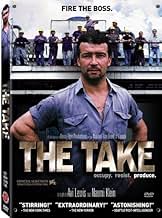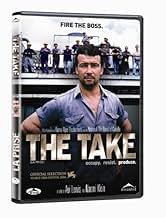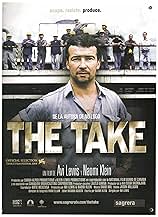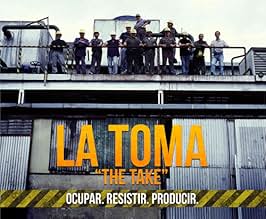AVALIAÇÃO DA IMDb
7,6/10
1,2 mil
SUA AVALIAÇÃO
Adicionar um enredo no seu idiomaIn the wake of Argentina's economics collapse of 2001, factory workers break into abandoned factories and restart production. Could these pioneers of cooperative ownership be a model for reb... Ler tudoIn the wake of Argentina's economics collapse of 2001, factory workers break into abandoned factories and restart production. Could these pioneers of cooperative ownership be a model for rebuilding Argentina's economy?In the wake of Argentina's economics collapse of 2001, factory workers break into abandoned factories and restart production. Could these pioneers of cooperative ownership be a model for rebuilding Argentina's economy?
- Prêmios
- 1 vitória e 5 indicações no total
Bill Clinton
- Self
- (cenas de arquivo)
Gustavo Cordera
- Self (singer)
- (as Bersuit)
Carlos Saúl Menem
- Self
- (as Carlos Menem)
Juan Domingo Perón
- Self
- (cenas de arquivo)
Avaliações em destaque
This movie helps progressive people address one of the main criticisms of the right and capitalists: what would you do differently if capitalism and globalization is so bad?
Argentina was a country where public utilities had been sold off and money fled the country. Factories were left empty, owing millions of dollars in taxes to various levels of government. The workers thought: we don't have jobs, so we can't buy things for our families. There are no jobs, because people aren't buying things for their families. So they broke the cycle, and with government approval (eventually) occupied the factories and just started producing items for themselves and their neighbors. The co-operative/collectivist movement in Argentina flourished.
The movie shows it was far from easy, and there are many hurdles left to overcome for this country and its people. But it's a hopeful message that if you buy locally, use locally produced services and products produced "locally", you create a viable economic cycle that enriches everybody. You may not have $40 microwaves produced someplace else on the other side of the world, but instead you get a quality product produced by your neighbour, that doesn't require the expense and waste of trans-global shipment. Then, the makers of cheap microwaves will be forced to pay their workers more in order to create a local/national market for their products, rather than using slave labour and shipping the products overseas to the "first world".
Okay, I'm off my soap box. Well done movie with real emotion and appeal.
Argentina was a country where public utilities had been sold off and money fled the country. Factories were left empty, owing millions of dollars in taxes to various levels of government. The workers thought: we don't have jobs, so we can't buy things for our families. There are no jobs, because people aren't buying things for their families. So they broke the cycle, and with government approval (eventually) occupied the factories and just started producing items for themselves and their neighbors. The co-operative/collectivist movement in Argentina flourished.
The movie shows it was far from easy, and there are many hurdles left to overcome for this country and its people. But it's a hopeful message that if you buy locally, use locally produced services and products produced "locally", you create a viable economic cycle that enriches everybody. You may not have $40 microwaves produced someplace else on the other side of the world, but instead you get a quality product produced by your neighbour, that doesn't require the expense and waste of trans-global shipment. Then, the makers of cheap microwaves will be forced to pay their workers more in order to create a local/national market for their products, rather than using slave labour and shipping the products overseas to the "first world".
Okay, I'm off my soap box. Well done movie with real emotion and appeal.
For folks of the leftist persuasion there's not really been a lot of cheerful stuff in the news for the past decade or three. The trouble with normal, as they say, is that it always gets worse. Most political documentaries are the same way -- something terrible is happening, the polemical narrator assures us, and other than the go-out-and-do-something last ten minutes of the film things are kind of universally bleak.
The Take opposes all of that, and is the rare piece of media in which the revolution is not just a vague series of values but an actual practise, made up mostly of hard work and disagreement, but moving forward in a positive direction nonetheless. Avi Lewis and Naomi Klein aren't the slickest filmmakers in the world, but they know enough to get out of the way and let the incredible story before them unfold. One of the few documentaries -- one of the few films period -- that I've left feeling genuine hope, this is a must-see for anyone who believes (or wants to believe) that another world is possible.
The Take opposes all of that, and is the rare piece of media in which the revolution is not just a vague series of values but an actual practise, made up mostly of hard work and disagreement, but moving forward in a positive direction nonetheless. Avi Lewis and Naomi Klein aren't the slickest filmmakers in the world, but they know enough to get out of the way and let the incredible story before them unfold. One of the few documentaries -- one of the few films period -- that I've left feeling genuine hope, this is a must-see for anyone who believes (or wants to believe) that another world is possible.
No one is more rad-chic than Naomi Klein, with her cool war-resister parents, alternative doctor father and militant feminist mother. She crossed Canada at 16 years old campaigning against nuclear power and wrote a hit book attacking globalisation in her 20s.
Now she has made a feel-good movie out of the economic catastrophe that hit Argentina, by following the weary campaign of unemployed steel workers to join a couple of hundred other factory occupations and take control of their abandoned steel works.
Klein and spouse Avi Lewis were in Argentina for some six months, with a crew of 16 and a budget of about C$1m, so we could certainly expect results. Whether this resounding endorsement of worker co-ops (slogan: Fire The Boss) is quite what the NFB had in mind is not clear.
At a couple of points, I felt the film ruined Argentina offered was about the repulsive imp Carlos Menem and the murderous bourgeois traitors he represented. Who is going to purge those secret policemen who rubbed out some 30,000 lefties? When are those generals going to face a court? Why was Menem not in prison instead of running for president? But the survival tactics of the workers on the ground was a more humane story, and that is to Klein's credit.
Now she has made a feel-good movie out of the economic catastrophe that hit Argentina, by following the weary campaign of unemployed steel workers to join a couple of hundred other factory occupations and take control of their abandoned steel works.
Klein and spouse Avi Lewis were in Argentina for some six months, with a crew of 16 and a budget of about C$1m, so we could certainly expect results. Whether this resounding endorsement of worker co-ops (slogan: Fire The Boss) is quite what the NFB had in mind is not clear.
At a couple of points, I felt the film ruined Argentina offered was about the repulsive imp Carlos Menem and the murderous bourgeois traitors he represented. Who is going to purge those secret policemen who rubbed out some 30,000 lefties? When are those generals going to face a court? Why was Menem not in prison instead of running for president? But the survival tactics of the workers on the ground was a more humane story, and that is to Klein's credit.
The Take is perhaps one of the most inspirational films I had ever seen. It provides an example to all of us - in terms of what we could accomplish if only we came together, if only we joined hands like those grandmothers in the streets of Argentina, like those workers who took production and decision making into their own hands. True democracy has to start from the bottom up, it has to start in the family, in the school, in the workplace, in the neighborhood and expand outward from there. Only when decisions in *all of these* social settings are made democratically, based on majority vote, only then, can our society begin to call itself democratic. This is currently not the case in the United States. It is not the case in the US family, nor in US schools, and no where is it more untrue than in the US workplace. Currently in the United States practically all decisions are made by those in power, by those with the money, and enforced on those underneath. When somebody gets fired from a workplace, do all the workers get together and vote on whether the person should be kept or fired? Do the children in the US schools have any democratic power to decide how things are done and organized? Do wives have equal power with their husbands in the American family? So how can a society that is so undemocratic claim to be a model of democracy for others? It is unfortunate that in the US democratic participation is limited to electing individuals to power, and is never directly related to policy issues. Our society would be much more democratic if we voted like specifically on the questions at hand both at the national and at the local level: REFERENDUM: Should US troops remain in Iraq? Should gay marriage be legal? Etc. All the questions that are most important to us, why don't we just vote specifically on them? The movie about Argentine factory workers has a message about democracy: "We vote often, that way we get used to loosing". If we were to vote more often, and to vote specifically on the issues that are important to us, then we would have a true participatory democratic society. So the Take, in my opinion is *a very important* film, and is something that all workers around the world and all people should learn from.
Some other comments I have about the Take are as follows. -By taking over Argentine factories, the workers are benefiting not only themselves and their families, but also their communities and Argentina as a whole, by contributing to economic recovery. I think this is a very important point. - It is unclear to me how the workers were able to make the factories profitable again, despite the economic crush. Because generally, when an economic collapse takes place and people lose jobs and savings, the demand for new goods declines, and that is probably why the factory owners were forced to shut down their factories in the first place. So how are the workers able to sell off their final products after taking over production? Is there some kind of barter system in place? Are the workers getting their inputs domestically instead of by importing them? I wish the film explained this. -The issue of private property is raised in the film. Should people really have the right to own stuff if they are not making good use of it? I mean, like if you are a kid with a toy, and you aren't playing with your toy, and the kids next to you want to borrow your toys because they actually want to play together, shouldn't you just give it to them, since you are not using it anyway? I mean why is the law on the side of those who want to keep their toys to themselves and do nothing with it?
Some other comments I have about the Take are as follows. -By taking over Argentine factories, the workers are benefiting not only themselves and their families, but also their communities and Argentina as a whole, by contributing to economic recovery. I think this is a very important point. - It is unclear to me how the workers were able to make the factories profitable again, despite the economic crush. Because generally, when an economic collapse takes place and people lose jobs and savings, the demand for new goods declines, and that is probably why the factory owners were forced to shut down their factories in the first place. So how are the workers able to sell off their final products after taking over production? Is there some kind of barter system in place? Are the workers getting their inputs domestically instead of by importing them? I wish the film explained this. -The issue of private property is raised in the film. Should people really have the right to own stuff if they are not making good use of it? I mean, like if you are a kid with a toy, and you aren't playing with your toy, and the kids next to you want to borrow your toys because they actually want to play together, shouldn't you just give it to them, since you are not using it anyway? I mean why is the law on the side of those who want to keep their toys to themselves and do nothing with it?
The collapse of Argentina's peso in 2001 threw millions out of work and plunged what had been one of Latin America's most prosperous countries in the 1990s into the kind of economic depression not seen in the United States since the 1930s. Four years later thousands of ruined businesses remain closed. In a handful of cases, though, workers occupied and reopened shut factories, health clinics, and schools as employee-owned and operated- cooperatives.
How Argentine workers did this is a terrific story. Unfortunately, "The Take", a film directed and narrated by anti-globalization activists Naomi Klein and Avi Lewis raises more questions than it answers.
According to Klein and Lewis, Argentine workers now run more than 200 companies employing 15,000 people. To explain how this happened, the movie documents a campaign by unemployed machinists to put a casting parts plant back in business. Along the way, we see examples of other successful cooperatives, including a shop of seamstresses, a ceramic tile manufacturer, and a tractor factory.
The new worker owners featured in "The Take" are earnest and enthusiastic. They are especially moving when describing the effects of years of unemployment and how their lives have improved for the better after returning to work. No one, though, tells us basic facts about these companies, such as whether wages and benefits have gone up or down under cooperatives, how the worker-owned companies pay for their raw materials, who buys their products, and if they make a profit. These are not idle points, as any owner Argentine worker or multinational plutocrat -- knows.
How does the "The Take" fill up its time? In between interviews with cooperative members about the glories of worker control we get lectures about the lack of differences among candidates in the 2003 Argentine presidential election, the pointlessness of voting, and the failings of the International Monetary Fund. We're also treated to a long slow motion sequence of a street riot in Buenos Aires complete with Mercedes Sosa soundtrack -- that depicts heroic workers and the equally heroic Klein and Lewis calling each other on their cell phones.
There's a good documentary to be made about what has happened to Argentina's economy and its workers. Klein and Lewis, however, take the easy way out and give us slogans and mushy analysis that leave the audience skeptical and suspicious.
4/10
How Argentine workers did this is a terrific story. Unfortunately, "The Take", a film directed and narrated by anti-globalization activists Naomi Klein and Avi Lewis raises more questions than it answers.
According to Klein and Lewis, Argentine workers now run more than 200 companies employing 15,000 people. To explain how this happened, the movie documents a campaign by unemployed machinists to put a casting parts plant back in business. Along the way, we see examples of other successful cooperatives, including a shop of seamstresses, a ceramic tile manufacturer, and a tractor factory.
The new worker owners featured in "The Take" are earnest and enthusiastic. They are especially moving when describing the effects of years of unemployment and how their lives have improved for the better after returning to work. No one, though, tells us basic facts about these companies, such as whether wages and benefits have gone up or down under cooperatives, how the worker-owned companies pay for their raw materials, who buys their products, and if they make a profit. These are not idle points, as any owner Argentine worker or multinational plutocrat -- knows.
How does the "The Take" fill up its time? In between interviews with cooperative members about the glories of worker control we get lectures about the lack of differences among candidates in the 2003 Argentine presidential election, the pointlessness of voting, and the failings of the International Monetary Fund. We're also treated to a long slow motion sequence of a street riot in Buenos Aires complete with Mercedes Sosa soundtrack -- that depicts heroic workers and the equally heroic Klein and Lewis calling each other on their cell phones.
There's a good documentary to be made about what has happened to Argentina's economy and its workers. Klein and Lewis, however, take the easy way out and give us slogans and mushy analysis that leave the audience skeptical and suspicious.
4/10
Principais escolhas
Faça login para avaliar e ver a lista de recomendações personalizadas
Detalhes
- Data de lançamento
- Países de origem
- Centrais de atendimento oficiais
- Idiomas
- Também conhecido como
- Захват
- Locações de filme
- Empresas de produção
- Consulte mais créditos da empresa na IMDbPro
Bilheteria
- Faturamento bruto nos EUA e Canadá
- US$ 30.380
- Fim de semana de estreia nos EUA e Canadá
- US$ 8.625
- 26 de set. de 2004
- Faturamento bruto mundial
- US$ 30.380
- Tempo de duração1 hora 27 minutos
- Cor
Contribua para esta página
Sugerir uma alteração ou adicionar conteúdo ausente























